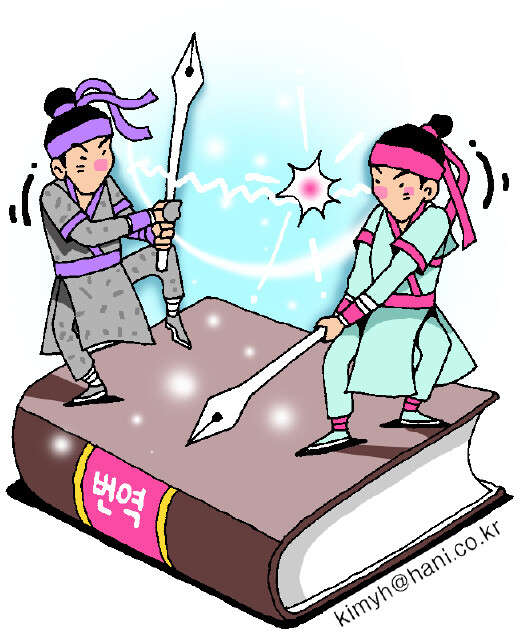hankyoreh
Links to other country sites 다른 나라 사이트 링크
Steve Jobs’ biography sparks translation debate

By Choi Won-hyung
A controversy over mistranslations in the Korean language version of Steve Jobs’ eponymous authorized biography has led to unprecedented “translation matches” on the Internet, with translators openly comparing their work.
The situation started when translator Lee Deok-ha called the Korean translation “riddled with errors” following its release last month, in a story reported on by the Hankyoreh on Oct. 28.
At the time, Lee said, “Translation in Korea is in such a sorry state that it is beyond our ability to resolve by ourselves. We need some kind of powerful shock from outside, such as large-scale criticisms of the translations.”
Veteran translator Noh Seung-young fired back at Lee’s criticisms, saying, “While it is necessary and desirable for mistranslations to be noted, these kinds of sweeping statements are fatal to publishing companies and translators, and we are seeing over and over a situation where mistakes in the mistranslations comments are elided over.”
The debate soon turned to the question of what exactly constitutes a “good” translation. Lee is a “literalist” who believes the translation should match the original text as much as possible, whereas Noh countered with the “liberalist” position that the text should be modified to make it as friendly as possible for readers.
One debate focused on the line “computer power to the people” in the Jobs biography. Lee said it should be translated literally as “minjung-ege keompyuteo gwollyeok” rather than using a free translation equivalent to “computers for people” in order to highlight the reference to John Lennon’s song “Power to the People.”
The liberalist Noh said it is up to the translator to decide whether to communicate that to the reader, and that “computers for people” should not be viewed as a mistranslation.
This difference of views led to a “translation battle” after Noh proposed a comparison of translations on Nov. 3 and Lee agreed to it. On Nov. 12, the two of them posted separate translations of the first chapter of James Wesley Rawles’ “How to Survive the End of the World as We Know It” on the website of Translation Consumer Alliance (cafe.naver.com/bunsoyun).
Internet users responded with their own arguments in hundreds of posts and replies. Critics said that Noh’s more reader-friendly translation “did not seem substantial, since major information was translated in a euphemistic way” and that “easy reading isn‘t everything.”
Regarding Lee’s more stilted but literal translation, critics said, “There’s only information, no feeling,” and commented that it was “uncomfortable to read.”
Beyond the debate over who was right or wrong, the battle was deep and varied discussions on everything from detailed translations of specific words to the translators’ bearing and enthusiasm.
Lee said, “Instead of considering the skill of the translator, you should consider the context and purpose of this debate over the translator’s authority.”
“There may be some criticisms, but I am certain this debate and comparison of translations will be helpful for the development of Korean translation,” Lee added.
Please direct questions or comments to [englishhani@hani.co.kr]
Editorial・opinion
![[Editorial] Does Yoon think the Korean public is wrong? [Editorial] Does Yoon think the Korean public is wrong?](https://flexible.img.hani.co.kr/flexible/normal/500/300/imgdb/original/2024/0417/8517133419684774.jpg) [Editorial] Does Yoon think the Korean public is wrong?
[Editorial] Does Yoon think the Korean public is wrong?![[Editorial] As it bolsters its alliance with US, Japan must be accountable for past [Editorial] As it bolsters its alliance with US, Japan must be accountable for past](https://flexible.img.hani.co.kr/flexible/normal/500/300/imgdb/original/2024/0417/6817133413968321.jpg) [Editorial] As it bolsters its alliance with US, Japan must be accountable for past
[Editorial] As it bolsters its alliance with US, Japan must be accountable for past- [Guest essay] Amending the Constitution is Yoon’s key to leaving office in public’s good graces
- [Editorial] 10 years on, lessons of Sewol tragedy must never be forgotten
- [Column] A death blow to Korea’s prosecutor politics
- [Correspondent’s column] The US and the end of Japanese pacifism
- [Guest essay] How Korea turned its trainee doctors into monsters
- [Guest essay] As someone who helped forge Seoul-Moscow ties, their status today troubles me
- [Editorial] Koreans sent a loud and clear message to Yoon
- [Column] In Korea’s midterm elections, it’s time for accountability
Most viewed articles
- 1[Column] The clock is ticking for Korea’s first lady
- 2Samsung barricades office as unionized workers strike for better conditions
- 3[Editorial] When the choice is kids or career, Korea will never overcome birth rate woes
- 4[News analysis] After elections, prosecutorial reform will likely make legislative agenda
- 5Why Israel isn’t hitting Iran with immediate retaliation
- 6S. Korea, Japan reaffirm commitment to strengthening trilateral ties with US
- 7[Editorial] Does Yoon think the Korean public is wrong?
- 8[Guest essay] How Korea turned its trainee doctors into monsters
- 9[Editorial] 10 years on, lessons of Sewol tragedy must never be forgotten
- 10Strong dollar isn’t all that’s pushing won exchange rate into to 1,400 range